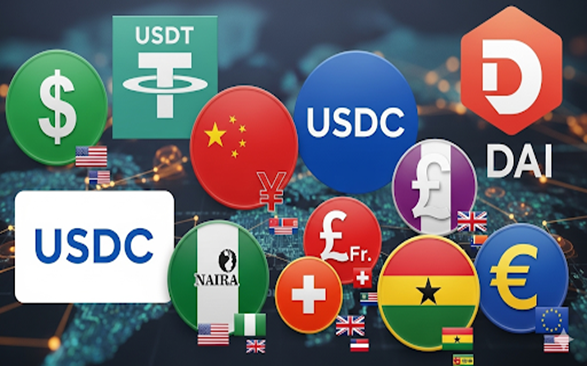Crypto trading entails buying and selling cryptoassets for profit-making. It can be practiced using various methods and on different platforms. These platforms are commonly known as crypto exchanges. While there are many cryptocurrency trading types, including futures trading, margin trading, arbitrage trading, and spot trading amongst others, market participants should be conversant with the risks and benefits associated with each before opting to engage.
Peer-to-peer (P2P) trading allows market participants to trade directly with each other using designated platforms or through over-the-counter (OTC) methods. P2P trading is among the most widely adopted crypto-trading types. These designated platforms are dubbed P2P trading platforms. Notably, this method has become highly popular, boasting huge daily transaction volumes as many governments around the world restrict local banks from facilitating transactions to and from crypto exchanges. Nigeria, for example, where the central bank of the country has such restrictions, is one of the world’s largest P2P markets, according to a Chainalysis report in 2022.
Thus, P2P trading can be especially beneficial in jurisdictions where access to traditional banking and financial services is limited, as it provides an alternative way to trade cryptocurrencies. While this crypto-trading type is characterized primarily by low fees, flexible payment methods, and escrow services, users must know its pros and cons as well as understand how it works in order to avoid falling victim to bad actors.
In this article, we will expose you to the top P2P crypto-trading, how P2P platforms work, and to the top 4 P2P crypto-trading platforms in the industry.
Read also: How to Make Money From Crypto Trading
What is P2P crypto trading?
P2P crypto trading refers to the direct exchange of a cryptoasset for cash or another cryptoasset between two individuals without the involvement of an intermediary. Here, the individuals involved are often familiar with each other.
This mode of trading remains one of the most simple crypto trading methods. This is because, just like the physical marketplace, buyers and sellers can interact with each other to exchange digital assets without the influence of a third party.
P2P crypto trading also entails the buying and selling of cryptoassets among market participants on P2P trading platforms using various methods such as bank transfers, cash payments, online wallets, or other agreed-upon means of transaction. Here, the P2P platforms often act as escrow to avoid the issue of fraud.
In P2P trading, buyers and sellers can interact directly with each other, negotiate the terms of the trade, and agree on the price and payment method. Nevertheless, this form of trading comes with its risks, which is why users should go for trusted crypto platforms that support P2P trading.
P2P trading platforms: How they work
From the foregoing, P2P crypto-trading platforms are online marketplaces or crypto exchanges that facilitate the direct trading of crypto assets between individuals. P2P crypto-trading platforms enable users to buy and sell cryptocurrencies directly with each other using various payment methods and communication channels.
To get started on a P2P crypto-trading platform, users must first create an account. While some platforms may require basic identity verification for security purposes, others may allow trading without extensive verification to preserve user privacy.
After successful registration, users can create listings to buy or sell specific cryptocurrencies. When placing a sell or buy advert, the quantity of cryptocurrency to be sold or bought, price, acceptable payment methods and other necessary terms must be indicated.
Users then browse through the available adverts to choose a suitable seller or buyer based on requirements, such as payment method, pricing, and trade volume to initiate a trade.
Notably, P2P trading platforms typically offer an escrow service. When a trade is initiated, the cryptoassets to be bought or sold are often placed in escrow, ensuring that neither party can run away with the funds before the transaction is completed.
For a P2P trade to be considered successful, the buyer must first transfer the agreed-upon payment to the seller using the selected payment method. Once the seller confirms receipt of payment, the cryptoassets are then released from the platform’s escrow account to the buyer’s wallet.
After completing the trade, both parties may have the opportunity to leave feedback and review their experience with each other. These reviews can help build a trader’s reputation and provide valuable information to others in the community.
Top 4 P2P crypto trading platforms in 2023
Binance
Founded in 2017 by Changoeng Zhao (CZ), Binance is the world’s largest digital assets exchange and leading blockchain ecosystem. Besides its spot, margin, and futures trading platforms, Binance offers P2P crypto trading services to its over 90 billion users. The p2p platform offers its users a variety of features allowing them to buy and sell several cryptoassets effectively.
Newbies and experienced users can enjoy transacting with a friendly user interface, no transaction fees, air-tight security, and access to over 150 payment options, including fiat currencies. Additionally, Binance provides its users with educational guides on how to trade safely.
OKX
With an average trading volume of about $1 billion daily, OKX is another widely used crypto exchange offering P2P crypto-trading services. The platform supports six cryptocurrencies, including bitcoin (BTC), Ethereum (ETH), True USD (TUSD), USD Coin (USDC), Tether (USDT), and DAI.
OKX P2P platform supports numerous payment methods, including more than 100 currencies. The platform creates an easy user interface for buyers and sellers alike.
KuCoin
Crypto traders living in countries with strict regulations against digital assets can also access KuCoin for P2P crypto trading because it is open to all with several payment options. The platform supports five currencies, including BTC, ETH, KuCoin, USDT, and USDC. Users do not have to worry about transaction fees when they trade their assets on the platform.
Paxful
Paxful is another prominent P2P cryptocurrency exchange platform that allows users to buy and sell Bitcoin (BTC) and other cryptocurrencies directly with each other. Established in 2015, Paxful supports a vast array of payment methods, including bank transfers, PayPal, Western Union, gift cards, and more. Users can choose the payment method that suits them best and find sellers willing to accept it.
The platform takes security seriously thus, provides various measures to protect users and their funds, including two-factor authentication (2FA) and escrow systems. To maintain security and adhere to regulations, Paxful requires users to go through a verification process, which may involve submitting identification documents.
More so, Paxful has a reputation system that allows users to rate each other based on their experiences during transactions. This system helps build trust and allows users to make informed decisions when choosing a trading partner. On fees, the popular P2P places charge some amounts on certain transactions. The fees may vary depending on the payment method and other factors.
However, apart from P2P crypto trading platforms, the use of instant-messaging platforms such as WhatsApp and Telegram, is quite popular. Reportedly, a sizable part of OTC transactions are conducted and completed via these platforms. AS would be expected, this comes with even more risks, including fraud, scams, and other illicit transactions. And this is why KYC documentation and a simple rule such as not receiving deposits from a third party are vital.
Read also: What are the top 5 centralized crypto exchanges you should know?
Read also: Top 5 Decentralized Crypto Exchanges You Should Know
Merits of using P2P crypto-trading platforms
Lower fees: P2P trading generally involves lower transaction fees compared to trading crypto assets on both centralized and decentralized exchanges. However, users should remain cautious of potential hidden fees set by individual traders.
Flexible payment methods: P2P trading platforms often offer various payment options, allowing traders to use methods that suit them best.
Escrow services: To mitigate the risk of fraud, some P2P platforms employ escrow services. These services hold the cryptocurrency being bought or sold in a secure account until both parties fulfill their obligations, ensuring a fair and secure trade.
Dispute resolution: Reputable P2P platforms often have mechanisms in place to handle disputes between buyers and sellers, providing an additional layer of protection for users.
What are the risks of p2p crypto trading?
Amid the myriad benefits of P2P crypto trading, there are risks associated with it. Therefore, it is essential to exercise caution when engaging to avoid the following potential risks involved:
Scams: There’s a risk of falling victim to scams or fraudulent activities, especially if the counterparty is untrustworthy or dishonest.
Lack of regulations: P2P trading is generally less regulated compared to centralized exchanges. This means users must take extra precautions and conduct due diligence before trading with strangers.
Security concerns: While P2P platforms employ numerous security measures, the risk of hacking or unauthorized access to personal information and funds is still present.
And whatever you do in P2P crypto trading, never accept deposits directly from third-party accounts.
Conclusion
There is no gainsaying that P2P crypto trading is gaining popularity by the day given its many advantages. Consequently, the count of platforms supporting this mode of trading continues to increase. However, P2P crypto trading also carries some risks, including the potential for scams and fraudulent activities. To mitigate these risks, users should research the reputation of the P2P crypto platforms out there before utilizing them, and conduct due diligence on their trading partners, including reviewing feedback from other users.
Read also: Tether (USDT) Stablecoin: Use Cases and Pros and Cons You Should Know
Credit: Ndianabasi Tom
A crypto journalist and content writer who has been talking about cryptocurrency and blockchain technology since 2018, Ndianabasi is a Writer at Crypto Asset Buyer (CAB).
Discover more from Crypto Asset Buyer
Subscribe to get the latest posts sent to your email.





